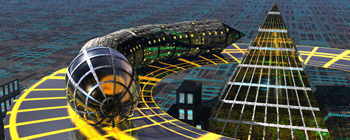| Slant by Greg Bear: A powerful angle on the future (Review by Rupert Neethling, Cape Town, South Africa)
The title of Bear’s new novel is derived from a line by Emily Dickinson: "Tell all the truth, but tell it slant". Of course, there may be no such thing as "straight" truth, but Bear shows how easily it can be bent even further. The novel describes an America in which the Internet, now known as the Multiway World Feed, predominates. And one of the things it "feeds" you, if you can afford it, is Yox -- a kind of direct-to-the-brain VR stimulation. Yox is a pleasureground of the senses: it’s sex, it’s interactive sitcoms, it’s fully-immersive excitement, it’s mundanity banished forever, or at least until your account dries up. Put another way: Yox is the truth of desire in the 21st century. And Yox is central to the lives of the multitudes. All other truths, all other facets of human existence, are marginalised, interpreted differently, slanted. Religion may have been the opiate of the masses in the time of Karl Marx: now it’s Yox. But don’t imagine that the people who oppose Yox are more admirable. The most powerful faction among Yox’s opponents are, to put it mildly, monsters. They are among the richest of the rich, and an elite group within this faction entertains practicable visions of genocide, followed by the enslavement of the survivors. "No more teeming maggots," one of them says. How this group of techno-fascists is
overcome forms the thread of the novel, but not the substance. That is dedicated to
exposing a human race that remains firmly entrenched in its adolescent phase, as well as Bear does hold out some hope in Slant, however. The monsters are, if not slain, then at least shackled for some time; there is Jill, the AI thinker who survived her own ordeal, albeit not unscathed and somewhat less patient with the foibles of the "bright monkeys" who created her; and there is the shadowy Jack Giffey, whose thoughts conclude the novel. Thoughts that Bear also addresses directly to the reader: "There are no tribes, no heroes, no gods or godly inspired prophets, no angels or sublimely superior individuals. There are only children." Leaving each of us to find our own way of climbing the steep slope of moral evolution. |
 where
technology itself is a main protagonist, is certainly an abiding feature of his work.
Particularly in the galaxy-roaming Anvil of Stars, the mathematically wondrous Eon,
Eternity and Legacy, as well as Moving Mars, which fuses an outward
cosmic focus with an inward quantum one. But Bear also demonstrates in Queen of Angels
and again in its sequel, Slant, that his most memorable fiction concerns humanity
itself.
where
technology itself is a main protagonist, is certainly an abiding feature of his work.
Particularly in the galaxy-roaming Anvil of Stars, the mathematically wondrous Eon,
Eternity and Legacy, as well as Moving Mars, which fuses an outward
cosmic focus with an inward quantum one. But Bear also demonstrates in Queen of Angels
and again in its sequel, Slant, that his most memorable fiction concerns humanity
itself. the ugliness of its behaviour when its desires are not fulfilled. The fact
that much of this ugliness is due to the engineered sabotage of "Therapy" -- a
constant nanotechnological readjustment of the brain for optimal psychological health --
is indicative of the extent to which the human race still takes vicious delight in harming
itself.
the ugliness of its behaviour when its desires are not fulfilled. The fact
that much of this ugliness is due to the engineered sabotage of "Therapy" -- a
constant nanotechnological readjustment of the brain for optimal psychological health --
is indicative of the extent to which the human race still takes vicious delight in harming
itself.
